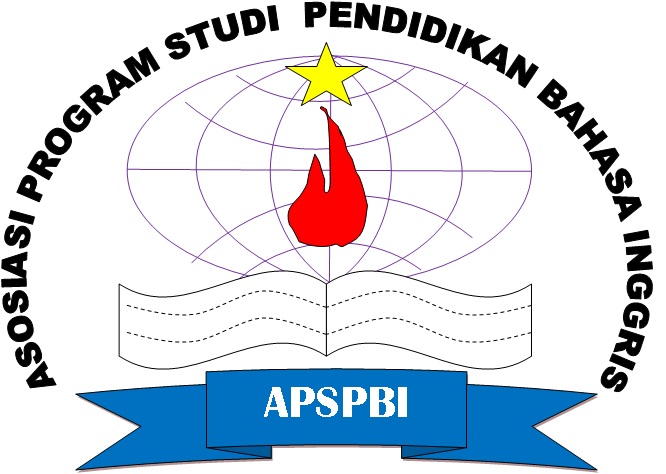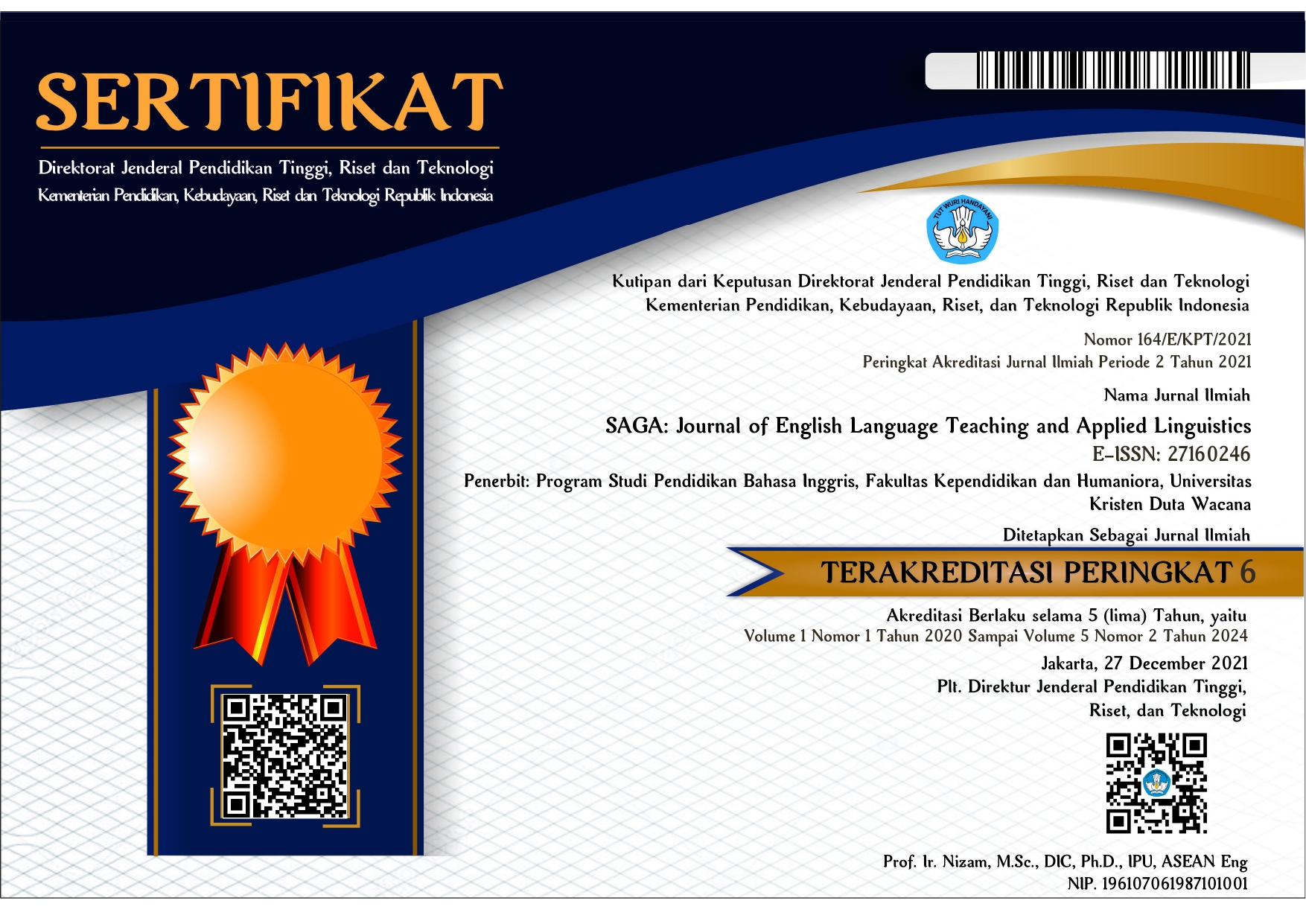Students’ Need to Increase Ethically Acceptable Paraphrasing of Academic Texts
DOI:
https://doi.org/10.21460/saga.2023.42.166Keywords:
Reading and Writing Knowledge, Plagiarism, Academic WritingAbstract
The lack of Indonesian students performing their abilities in L1 paraphrasing becomes the primary reason they are labeled as persistent plagiarizers. Students, in Indonesian context and circumstances, need to broaden their perspectives regarding how to document the sources, using them in their original papers to support and defend the arguments. Literacy should be developed sustainably in order for students might critically think and state things with evidence. However, to say that students still developing English writing text as intentional plagiarism will appear to be overly harsh. Teachers, at the university level, should acknowledge that students’ commitment to plagiarism is the process of knowing its definition, characters, impacts, and habit of copying others’ work without any attempt to document it properly. Moreover, it also signs the teachers that students’ ability to use academic English needs improving. Observing these facts urges us to facilitate students to make them ready to conduct the paraphrase of the L2 texts while their EAP is still developing. This study seeks the fundamental preparation that should be made to generate acceptable paraphrasing texts.
References
Doolan, S. M. (2021). An exploratory analysis of source integration in post-secondary L1 and L2 source-based writing. English for Specific Purposes, 62, 128–141. https://doi.org/10.1016/j.esp.2021.01.003
Endahati, N., & Widagsa, R. (2018). Social media as strategy to improve students’ motivation and participation in English subjects. Elite Journal, 66(2), 37–39. https://www.fairportlibrary.org/images/files/RenovationProject/Concept_cost_estimate_accepted_031914.pdf
Hirvela, A., & Du, Q. (2013). “Why am I paraphrasing?”: Undergraduate ESL writers’ engagement with source-based academic writing and reading. Journal of English for Academic Purposes, 12(2), 87–98. https://doi.org/10.1016/j.jeap.2012.11.005
Hungwe, V. (2019). Using a translanguaging approach in teaching paraphrasing to enhance reading comprehension in first-year students. Reading and Writing (South Africa), 10(1), 1–9. https://doi.org/10.4102/rw.v10i1.216
Islamiyah, M., & Al Fajri, M. S. (2020). Investigating Indonesian master’s students’ perception of critical thinking in academic writing in a British university. Qualitative Report, 25(12), 4402–4422. https://doi.org/10.46743/2160-3715/2020.4058
Ji, N.-Y. (2018). Investigation into the validity of paraphrasing task as a writing performance test item for EFL Learners. Modern English Education, 19(2), 20–29. https://doi.org/10.18095/mee.2018.19.2.03
Mafiza, D., & Wiyanah, S. (2022). Students’ perceptions on using Google classroom. Jedu, Journal of English Education, 2(2), 46–54.
Mira, A. S., & Fatimah, S. (2020). Students’ paraphrased texts and their perceptions of paraphrasing in academic writing. Lingua Didaktika: Jurnal Bahasa Dan Pembelajaran Bahasa, 14(1), 55. https://doi.org/10.24036/ld.v14i1.108732
Prasetya, R. E., & Syarif, A. (2022). Assessment and feedback to enhance online English language learning. Metathesis: Journal of English Language, Literature, and Teaching 6(1), 85–100. https://doi.org/10.31002/metathesis.v6i1.185
Rogerson, A. M., & McCarthy, G. (2017). Using internet-based paraphrasing tools: original work, patchwriting or facilitated plagiarism? International Journal for Educational Integrity, 13(1). https://doi.org/10.1007/s40979-016-0013-y
Schwabl, K., Rossiter, M., & Abbott, M. (2013). University students’ and instructors’ paraphrasing and citation knowledge and practices. Alberta Journal of Educational Research, 59(3), 401–419.
Scroggs, A. P. (2015). Becoming concise and original: Paraphrasing strategies of ESL university writers. The Conference Proceedings of MIDTESOL, 2015, 105–115. http://midtesol.org/docs/Proceedings2015/Becoming Concise and Original.pdf
Seran, E. D., & Irawan, R. (2021). The correlation between the teacher’s oral feedback and the students’ writing motivation. FOSTER: Journal of English Language Teaching, 2(3), 358–371. https://doi.org/10.24256/foster-jelt.v2i3.51
Shi, L. (2021). Professors’ views of content transformation in students’ paraphrasing. Journal of Response to Writing, 7(2). https://scholarsarchive.byu.edu/journalrw/vol7/iss2/5
Shi, L., Fazel, I., & Kowkabi, N. (2018). Paraphrasing to transform knowledge in advanced graduate student writing. English for Specific Purposes, 51, 31–44. https://doi.org/10.1016/j.esp.2018.03.001
Subekti, A. S. (2022). Teaching Indonesian L2 learners’ academic writing: A proposed instructional model. SAGA: Journal of English Language Teaching and Applied Linguistics, 3(2), 91–102. https://doi.org/10.21460/saga.2022.32.134
Sukowati, S., Mustadi, A., Putro, A. A. Y., & Pradewi, G. I. (2020). Self-regulation of primary education pre-service teachers. Journal of Education and Learning (EduLearn), 14(2), 263–271. https://doi.org/10.11591/edulearn.v14i2.13983
Wahyuni, K. A. S., Handayani, N. D., & Bagus, I. N. M. (2020). The use of picture series to improve writing skills of EFL learners. International Journal of Applied and Sustainable Development, 2(2), 33–37. https://e-journal.unmas.ac.id/index.php/IJASSD/article/view/1205/1027
Wijaya, K. (2022). English education master students’ perceptions on metacognitive strategy in academic reading. Acuity: Journal of English Language Pedagogy, Literature and Culture, 7(2), 150–160. https://doi.org/10.35974/acuity.v7i2.2696
Zhao, R., & Hirvela, A. (2015). Undergraduate ESL students’ engagement in academic reading and writing in learning to write a synthesis paper. Reading in a Foreign Language, 27(2), 219–241. http://search.proquest.com.libproxy.lib.unc.edu/docview/1750503062?pq-origsite=summon
















